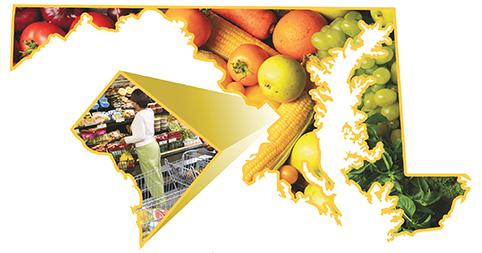Maryland’s ethnically diverse population supports its breadth of produce sales: from growers to wholesalers, chains to independents, home delivery to farmers’ markets, and foodservice of all types. The reason is simple: “There’s a lot of business here because there are a lot of people,” quips Bill Class of Class Produce Group, LLC, based in Jessup.
Since the state’s retail market spills into the metro regions of northern Virginia and southern Pennsylvania, as well as nearby Washington DC—there’s an ever-expanding cache of customers. There are also growers, both large and small, that send an enticing array of fruits and vegetables to market in the area. “Consumers in Maryland say on survey after survey they prefer produce grown in Maryland—that’s a strong allegiance to ‘local’ in our state,” comments Joe Bartenfelder, Maryland’s Secretary of Agriculture. And, with the rise of all foods local, wholesalers and retailers have clamored to label and leverage Maryland-grown products.
To understand Maryland’s local vegetable production, head east from Baltimore across the Chesapeake Bay Bridge to the Eastern Shore. Here you’ll find seasonal growers harvesting acres of watermelon, sweet corn, snap beans, cantaloupe, cucumbers, and tomatoes. Then there’s apple orchards, mainly in the western portion of the state.
Monitoring the Market
Eastern Shore vegetable growers find many buyers in the Maryland Food Center, the 400-acre site located between Baltimore and Washington DC, just off Route 175 between I95 and the Baltimore-Washington Parkway. The Center houses the Maryland Wholesale Produce Market, commonly called the “Jessup Market,” as well as a warehouse space for regional and national players like Sysco and Del Monte. “We also have one of the only truck stops in this part of Maryland,” remarks Rose Harrell, director of facilities for the Maryland Food Center Authority (MFCA), an added convenience for both short- and long-haul drivers.
Terminal market tenants find sourcing straightforward. “At this location, there is no problem sourcing any products,” comments Tony Vitrano, president and CFO of the Tony Vitrano Company, one of the market’s 25 tenants. Vitrano says merchants are moving more and more local and regional produce. “Until recently, we were primarily sourcing nonregional,” he recalls. “Now we’re sourcing seasonally from Maryland, Virginia, Delaware, Pennsylvania, West Virginia, New Jersey. Even Ohio, in the whole scheme of things, is not that far away.”
Jessup is also home to many firms outside the terminal market. “It’s an ideal area, a transportation terminus,” observes Jerry Chadwick, vice president at Lancaster Foods, a wholesaler and fresh-cut processor serving the East Coast. Chadwick receives produce from shippers near and far, including international loads from the Port of Philadelphia, air freight from Dulles International Airport in Washington DC, and trucks from Miami.



